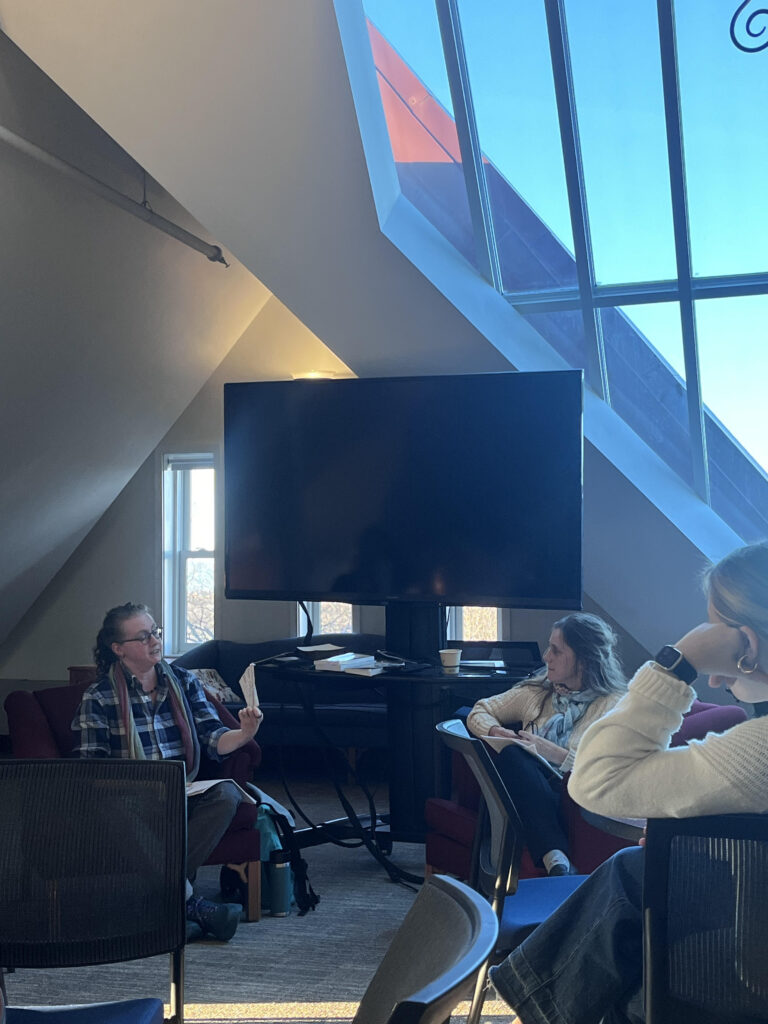Professors Andrea Kaston Tange and Rachel Gold Share Writerly Wisdom at Lit Salon
Contact
The Words: Macalester's English Student NewsletterSenior Newsletter Editors:
Birdie Keller '25
Daniel Graham '26
Callisto Martinez '26
Jizelle Villegas '26
Associate Newsletter Editors:
Ahlaam Abdulwali '25
Beja Puškášová '26
Sarah Tachau '27
Peyton Williamson '27
by Daniel Graham ’26

Over the past couple years in the English department, we have hosted a few Literary Salons each semester. At these events, we invite an author or poet or anyone doing anything amazing in the literary community to come chat with us.
Most of the time, that person comes from outside Macalester, which makes it easy to forget just how much in-house talent we have right here in Old Main. On February 26th, we got a wonderful opportunity to learn more about some of the phenoms who work on our English faculty from two of our best: Professors Andrea Kaston Tange and Rachel Gold.
All our professors are always writing something (check out our Instagram page for proof), and these two are no exception. Kaston Tange has written a creative nonfiction book that she calls an investigative family memoir and is now in the revision process. Gold is writing a lot of different things right now, but they chose to focus on just two of them: a nonfiction book about the X-Men and a companion novel to their 2023 book Curious Minds.
Each writer spent fifteen minutes at the start of the Literary Salon describing their work and read a short passage, then they spent the final thirty minutes in Q&A. Kaston Tange was first to discuss her work, which she has tentatively titled Flowers for the Living.
Kaston Tange drew from her great-grandmother’s diary, which details the eight months between 1926 and 1927 when her family vacated Dearborn, Mich. for Miami, Fla. She combined this ancestral artifact with rigorous research.
The densest research that Kason Tange produced for her book was about the hurricane that hit Florida’s coast right before her family arrived. She read from the passage where she details the efforts of Richard Gray, head of the Miami Weather Bureau Office to inform the public about the impending carnage:
“Gray and his staff did their jobs heroically, as his official Meteorological Notes attest. Where he generally typed a few sentences recording rainfall and pertinent data, the entry for Saturday, September 18th extends for three pages and provides an astonishingly meticulous record of the storm’s progress and the staff’s courage. The Office lost its rain gauge, which the station assistant “Mr. C. B. Moseley, jr.,” went out to replace around 3:45 a.m. Wind velocities were then measuring around 100 miles an hour. Fifteen minutes later, the gauge and the entire instrument shelter were swept away by the gale. When the electricity was lost, they carried on taking measurements by flashlight.”
After Kaston Tange’s reading, Gold took the stage to describe their current works. They explained that their companion novel to Curious Minds follows a new main character who uncovers the details of an anti-gay lawsuit that happened at her college in the 90s. Gold said that the school “definitely” isn’t Macalester, even if it is based on their friendships and experiences at the college in that decade and is set at an institution with remarkable similarities.
They also discussed and read from the nonfiction book about the X-Men. They explained how the group writing the book has dwindled from a five-person project to a two-person scramble that has piled onto their already ponderous workload.
The chapter they started with, however, has been one of Gold’s passion projects for a while. It explores how the X-Men character Magik, or Ilyana Rasputin, is one of the best representations of trauma recovery in US pop culture, which has historically avoided such conversations. The tentative title for the chapter is “The Magik of Trauma Recovery.” It explores the X-Men character’s chronicles and the remarkable exploration of the human mind within those pages.
Gold read the following from the start of that chapter:
“The modern West often seems unwilling to admit that psychological abuse of children is possible. And yet studies conducted in the last fifteen years have begun to show its immense impact, an impact that can outstrip that of physical abuse. Illyana’s story lets the visual narrative medium of comics — with demons, magic, superpowers and a shifting hellscape — show that often invisible impact.”
Neither of these two professor’s works are finalized yet, so both the excerpts published here may change or cease to exist altogether in the final print version. Both discussed the joys that accompany the writing and revising process, and their very different styles — Gold keeps most of their work digital, while Kaston Tange prefers to work in the physical realm, printing her pages and laying them out to reorder them.
While both currently face obstacles to publication — Kaston Tange needs to find a publisher willing to put her work on shelves, Gold needs to produce a far greater portion of a book than they initially thought — they both emphasized how much they enjoy the writing process. They each have their special places for writing. For Kaston Tange, it’s a tiny alcove above her front porch with a comfy chair and a desk. For Gold, it’s a bed with a desk over it, so that they can write at a 45 degree angle on a massive computer screen. They both have their own methods for writing and finding joy in their work.
Make sure to keep an eye out for their writing in the future. We can assure you that you won’t want to miss anything that anyone in this department publishes.